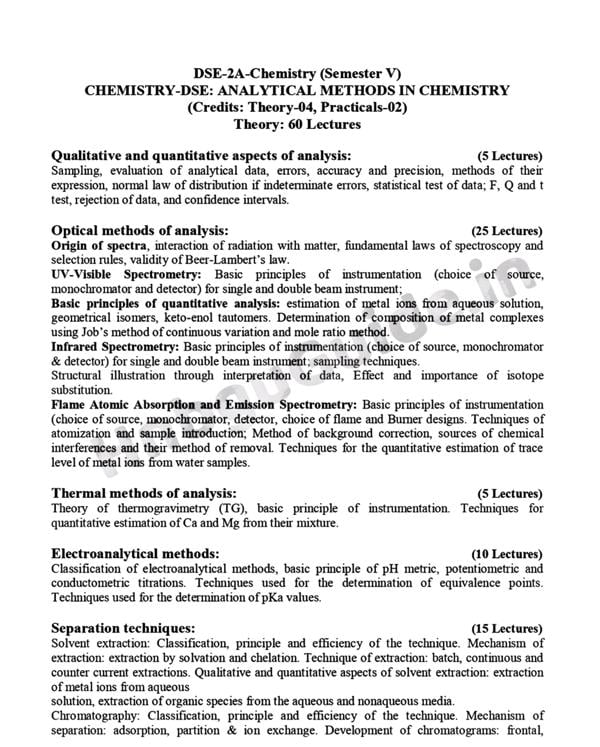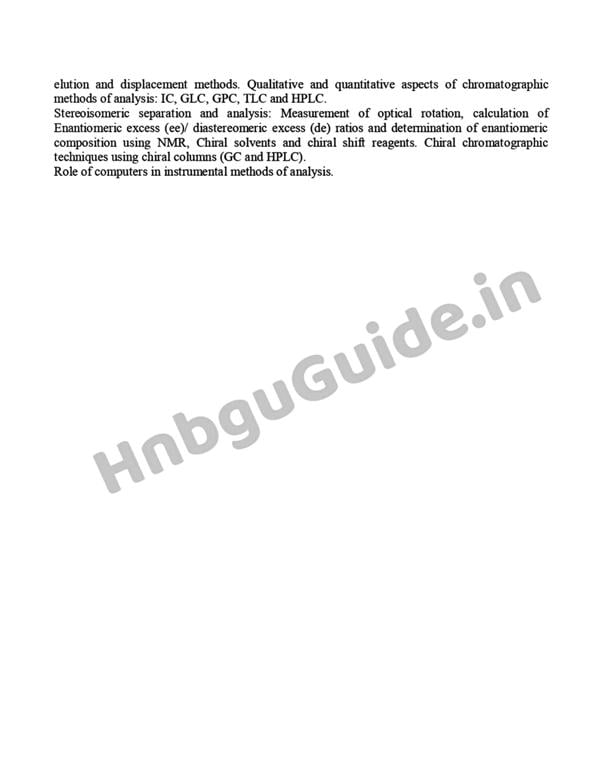HNBGU BSc CBZ (Chemistry) 5th Sem Full Syllabus 2021-22 Or Bachelor of Science Chemistry in CBZ (3rd Year) Syllabus Read online 2021-22.
B.Sc. Semester-V”Syllabus Chemistry
H.N.B. GARHWAL UNIVERSITY SRINAGAR GARHWAL (Central University)
New Syllabus B.Sc. – V” Semester, Chemistry
DSE: ANALYTICAL METHODS IN CHEMISTRY
Theory: 60 Lectures
1. Qualitative and quantitative aspects of analysis: Sampling,
evaluation of analytical data, errors, accuracy, and precision, methods
of their expression, normal law of distribution if indeterminate errors,
statistical test of data; F, Q and test, rejection of data, and confidence intervals.
(5 Lectures)
2. Optical methods. of analysis: Origin of spectra, the interaction of
radiation with matter, fundamental laws of spectroscopy and selection
rules, the validity of Beer-Lamberts law.
* UV-Visible Spectrometry: Basic principles of instrumentation (choice
of source monochromator and detector) for single and double beam
instrument
* Basic principles of quantitative analyst estimation of metal ions from
the aqueous solution, geometrical isomers, keto-enol tautomers.
* Determination of the composition of metal complexes using Job’s method
continuous variation and mole ratio method.
* Infrared Spectrometry: Basic principles of instrumentation (choice of
source, monochromator & detector) for single and double beam
instrument; sampling techniques.
* Structural illustration through interpretation of data, Effect, and
importance of isotope substitution.
* Flame Atomic Absorption and Emission Spectrometry: Basic
principles’ of instrumentation (choice of source, monochromator,
detector, choice of flame, and Burner designs. Techniques of
atomization and sample introduction; Method of background
correction, sources of chemical interferences, and their method of
removal. Techniques for the quantitative estimation of trace levels of
metal ions from water samples.
(25 Lectures)3. Thermal methods of analysis: Theory of thermogravimetry (TG),
the basic principle of instrumentation. Techniques for quantitative
estimation of Ca and Mg from their mixture. (5 Lectures)4. Electroanalytical methods: Classification of electroanalytical methods,
the basic principle of pH metric, potentiometric and conductometric
titrations. Techniques used for the determination of equivalence points.
Techniques used for the determination of pKa values. (10 Lectures)5. Separation techniques: Solvent extraction: Classification, principles,
and efficiency of the technique.
* Mechanism of extraction: Extraction by solvation and chelation.
* The technique of extraction: Batch, continuous, and counter-current
extractions. Qualitative and quantitative aspects of solvent extraction:
extraction of metal ions from aqueous solution, extraction of organic
species from the aqueous and nonaqueous media.
-Chromatography: Classification, principles, and efficiency of the technique.
Mechanism of Separation: adsorption, partition, and ion exchange.
* Development of Chromatograms: frontal, elution, and displacement methods.
* Qualitative and quantitative aspects of chromatographic methods
of analysis: IC, GLC, GPC, TLC, and HPLC. Stereoisomeric separation
and analysis: reagents. Chiral Measurement of optical rotation, calculation
of Enantiomeric excess (cc)/ diastereomeric excess (de) ratios, and
determination of enantiomeric composing using NMR, Chiral solvents,
and chiral shift chromatographic techniques using chiral columns (GC and HPLC).
* Role of computers in instrumental methods of analysis. (15 Lectures)


In the Syllabus, there are 2 parts of the particular subject Chemistry, which confuses us a little bit.
Don’t worry, HNBGU GUIDE is here to solve this confusion. In this Syllabus, it has been divided into 2 parts-
- Analytical Method in Chemistry
- Polymer Chemistry
In the 2022 External exam, Analytical Method in Chemistry is the part that comes in the exam. And in 2021 the same portion is repeated in External Exam.
So most of the time HNB gives the Analytical Method in Chemistry portion in the 5th sem. (That's why we mainly provide the Analytical Method in Chemistry Syllabus)
- If you need the Polymer Chemistry Syllabus then post a comment down below and we’ll surely provide that syllabus too.
Check out our homepage for Previous year question papers (According to with semesters as well) with respect to your subjects-
Also, read the question paper of these subjects (B.Sc. CBZ):
1. Botany
2. Chemistry
3. Zoology
4. English
B.Sc. CBZ refers to Bachelor in Science of main subjects Chemistry, Botany and Zoology.
We also provide the last 5 to 10-year question papers for Hemvati Nandan Bahuguna Garhwal University (HNBGU) fifth semester BSc PCM students.
In this article, HNBGU GUIDE provides is Chemistry Syllabus (B.Sc CBZ) fifth semester (2022). To check more papers, you can go to our home page where you find all papers according to your preparation.
HnbguGuide.in provides you with a well-arranged set of previous year question papers in order to help you. To prepare for your Hemvati Nandan Bahuguna Garhwal University (HNBGU) fifth semester BSc CBZ Chemistry Syllabus.
As we all are very well aware that the syllabus of HNB Garhwal University provides us with what to study for the exams.
BSc CBZ Chemistry 5th Sem Syllabus
Why HnbguGuide.in?
Bachelor of Science Semester 1, all subjects last 6 years old papers are available here. And all papers of HNBGU University pattern. If you want papers that we didn’t provide, you can use the request papers feature on our website.
On this site, we also provide B.Sc semester 1 to B.Sc semester 6 old papers of Hemvati Nandan Bahuguna Garhwal University (HNBGU).
Not only Syllabus, but we also provide:
- Latest Notifications from University
- Previous Year question papers
- Study Notes
FAQ’s
No, this is not an official site of HNB Garhwal University. The Official site of HNBGU is hnbgu.ac.in.
This site is just a guide for the students of HNB University. As we provide previous years’ papers with syllabi and other stuff according to the needs of the students.
The answer is simple- Definitely, it will help you.
By checking out the Previous Years of Question Papers, you will get an idea of the pattern of exam papers.
And in many cases, you will get 1-2 questions similar to your upcoming internal or external exams (on personal experience).
As in many colleges, the internal paper is different from other colleges. So to sort out this problem, we just added the external paper on our site, which is the same in all colleges affiliated with HNB Garhwal University.
Its major benefit is you can easily pass. As in the university exam, mostly repeated questions are there and you can easily write a paper with 40 to 50 marks.
Many Colleges are affiliated with Hemvati Nandan Bahuguna Garhwal University (HNBGU), Srinagar, so the external papers are prepared by the university.
On another side, Internal Papers are set or prepared by the college itself. So in every college, the internal papers are different from each other.
Keep In Mind Some Important Points Before Attempting Any Sample Paper:
1. Start studying the whole syllabus deeply once.
2. Study previous year’s question papers online according to your course or subjects.
3. Mark out those topics and questions which you find so difficult to answer.
4. Next, time while studying the whole syllabus, focus on your weak areas more.
5. Study other old question papers, but this time study more than 2 question papers.
6. Repeat the process.
HNBGU’s previous year’s question papers for annual exams and HNBGU exam question papers are available for free study on hnbguguide. in.
HNBGU old question papers help students to understand the actual question paper pattern and marking scheme too. It is suggested to study and practice these previous year’s question papers.
Check out our homepage for more Previous year question papers (According to with semesters as well) with respect to your subjects-
Also, read the question paper of these subjects (B.Sc. CBZ):
1. Botany
2. Chemistry
3. Zoology
4. English


